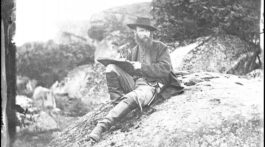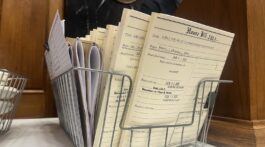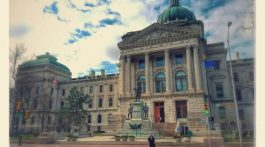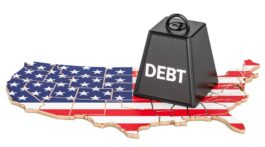by Niki Kelly, Indiana Capital Chronicle
February 10, 2025
A House panel examining how to increase road funding dialed back a wide-ranging bill Monday.
The House Roads and Transportation Committee accepted a substantial amendment to House Bill 1461 to remove several key concepts from the bill. That includes:
A local option for counties to add a fee for delivery businesses such as Amazon and DoorDash.Language limiting the incentives the Indiana Economic Development Corporation could offer depending on infrastructure needs.An Indianapolis referendum to create an additional property tax levy.
“As introduced, 1461 was a plate full of options, lots options, a la carte buffet. And my goal was really to start multiple conversations, good, bad or indifferent,” said Rep. Jim Pressel, R-Rolling Prairie. “I think when I opened with the underlying bill, I said, ‘Here’s 37 pages of things that may be a good idea, some things I really like, and some things that probably need to go.’ And that’s what amendment number 11 is going to do.”
Motor fuel taxation yields eight of every 10 state dollars that fund roads and bridges for both the Indiana Department of Transportation (INDOT) and local governments. But as Hoosiers upgrade to more fuel-efficient vehicles — or try electric and hybrid options — there is less money to work with.
And inflation means those dollars aren’t stretching as far.
The amendment also made changes to other parts of the bill.
Under the amendment, the cap rose to $200 million.
The changes also impact township governments. Initially, communities could tap into surplus money held by townships.
Pressel said townships are holding $688 million statewide in reserves and his goal is to identify excess dollars that could go to roads.
But Deborah Driskell, executive director of the Indiana Township Association and Delaware township trustee, said the change went too far and could lead to local tax increases.
She argued that some of the money Pressel is referring to is restricted to bond payments or future capital improvement, and suggested he focus on unobligated funds instead.
“I don’t think that’s an accurate picture that we have that much discretionary cash,” Driskell said.
When she suggested optional language, Pressel pushed back saying “we all know how options will work. We will opt to not do it.”
He promised to continue working on the township language and the committee passed the bill unanimously. It now goes to House Ways and Means because of its fiscal impact.











